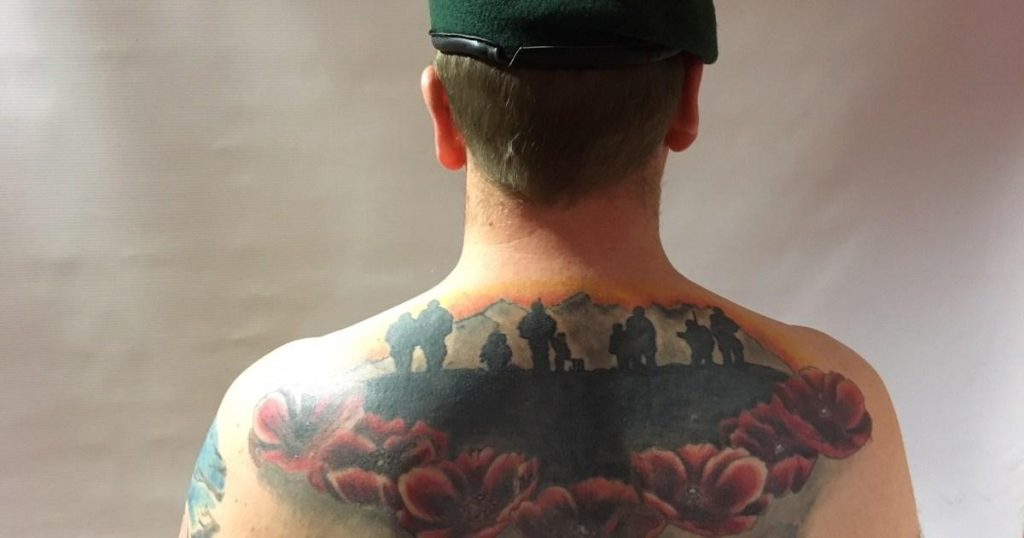Rob French’s story, etched onto his back in the form of seven red poppies and seven soldier silhouettes, is a poignant testament to the enduring impact of war. The tattoo memorializes seven Royal Marines, Rob’s comrades, who perished within weeks of each other in Afghanistan during December 2008. The image, seen in a newspaper article, deeply affected the author, prompting a meeting with Rob, who agreed to share his story not for personal recognition, but to raise awareness for the Royal British Legion’s Poppy Appeal. He emphasized that the story was about his fallen comrades, not himself, and that he carried their memory with him always.
The details of their deaths are stark and heart-wrenching. Three were killed by a young suicide bomber, another in a separate explosion on the same day. Two more lost their lives to rocket-propelled grenades during a patrol, and the final comrade, Ben Whatley, was killed by enemy fire on Christmas Eve. Rob, who served as a machine gunner, had been sent home with a broken wrist just two weeks prior to Ben’s death. This close call left him grappling with survivor’s guilt, tormenting him with the thought that he might have been in Ben’s place had he remained in Afghanistan.
This guilt, coupled with the trauma of war, led to a diagnosis of post-traumatic stress disorder (PTSD). The weight of his experiences was immense, leaving him haunted by their loss. For years, he struggled, until finally seeking help from Combat Stress in 2015. Around the same time, he decided to get the tattoo, a physical embodiment of his fallen friends, a way to carry them with him, not as a burden, but as a source of strength. Therapy and the tattoo provided a degree of solace, but the guilt and PTSD persisted, manifesting in night terrors and vivid flashbacks. He vividly recalled the Afghan sun and the scents of the bazaars, highlighting the powerful grip of his memories.
Rob’s story prompted the author to delve deeper into the devastating impact of the war in Afghanistan on British soldiers. Research revealed the grim statistics: 454 British forces personnel or MOD civilians had died in Afghanistan since 2001, and a staggering 2,000 soldiers and veterans were estimated to have taken their own lives since the war began. This tragic figure exceeded the number of combat fatalities in 2012, underscoring the silent toll of war on mental health. These were not just statistics, but individuals like Rob, who served their country and paid a heavy price. Inspired by Rob’s story and the stories of countless others, the author decided to create a fictional character, a decent man battling PTSD and the ghosts of war, mirroring the experiences of many veterans.
Years later, the author contacted Rob to share news of a book deal. Rob’s response was selfless, focusing not on himself, but on the potential for the book to raise awareness about PTSD. He had found a new purpose, pursuing a degree in psychology and training to become a therapist specializing in PTSD and trauma. Counseling had transformed his life, and he was determined to help others navigate similar struggles. He felt a responsibility to his fallen comrades to live a meaningful life, not to succumb to the weight of his experiences, but to use them to support others.
Family life also provided renewed purpose. With two sons, Joseph and Oliver, and a daughter, Freyja, from his second marriage, Rob considered himself fortunate. Despite his personal progress, he remained committed to supporting military charities and raising awareness for PTSD. His dedication was recognized with an invitation to the Coronation of King Charles III, a testament to his tireless efforts. However, even amidst his positive strides, reminders of loss persisted. Two more former comrades took their own lives the previous Christmas, a stark reminder of the ongoing battle. Despite these setbacks, his family, his new career, and his charity work provided the strength to persevere. His passion for helping veterans suffering from PTSD was unwavering. The author hopes that their book, “Six Poppies,” sheds light on the struggles these individuals face, honoring their sacrifices and promoting understanding. The final note points to the Royal British Legion’s critical role in providing support for serving and ex-serving members of the Armed Forces and their families, urging readers to donate and contribute to their life-changing services.











